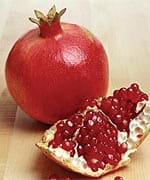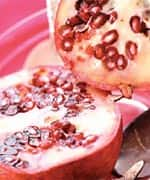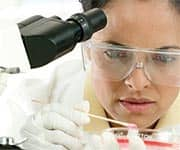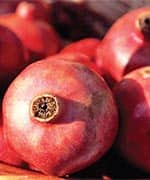Life Extension Magazine®
In 1980, the Life Extension Foundation published its first health newsletter. Since then, we have introduced dozens of nutrients, hormones, and drugs that are now proven to prevent and treat a wide variety of ailments. The fruit juice we are about to highlight is not new—but the human clinical studies are. Based on these findings, it may now be possible for people with severe atherosclerosis to reverse it. Those who have relatively healthy arteries to begin with might be able to significantly delay or prevent the onset of atherosclerosis. If all this fruit did was protect our inner arterial wall (the endothelium), then it may be the most important agent that aging humans could ingest. What has scientists most excited, however, is a new human study showing that this fruit dramatically slowed the progression of prostate cancer in those who already failed conventional treatment.1 These expensive human studies were conducted based on an abundance of test tube and live animal data indicating this fruit might prevent and treat vascular disease and prostate cancer.2,3,9-13,25,26 These same test tube studies show that this fruit may also be effective against breast cancer.27-30 Prescription medications can slow the progress of atherosclerosis, but they rarely reverse it. To significantly reduce human mortality, a way to stop age-associated arterial deterioration must be found. As you will soon read, this may have been achieved in humans with a fruit that functions via mechanisms quite different from conventional drugs. Government agencies caution consumers to be leery of health products that promise “miraculous” results. The reason for these warnings is that unscrupulous companies continue to make outlandish claims with little scientific substantiation to back them. While it may be too early to promise “miraculous benefits” in response to ingesting this fruit, the human studies supporting it are miraculous from a scientific standpoint. This article provides a summary of recent findings that explain why even some mainstream doctors are recommending that their patients consume this fruit juice every day. Reversing AtherosclerosisWhile certain drugs, nutrients, and hormones can slow the progression of atherosclerosis, very little has ever been shown to reverse existing artery disease. One reason it is so difficult to reverse atherosclerosis is that arterial disease is primarily caused by aging itself (via the destructive process known as endothelial dysfunction). This means that a person with atherosclerosis has to first stop the artery-damaging process and then reverse the damage and occlusion to the arterial wall that has accumulated over a lifetime. Atherosclerosis can be measured in humans by conducting an ultrasound test of the carotid arteries in their necks. An ultrasound provides a specific reading of the narrowing (or blockage) that has occurred by measuring the thickness of the inner and middle walls of the carotid artery. This is known technically as an intima-media thickness test (IMT). A controlled human study was conducted involving patients with severe carotid artery narrowing (stenosis).3 One group received conventional drugs only (statins and anti-hypertensives), while the other group received pomegranate juice plus the same drugs. The findings observed in the pomegranate group were unprecedented. After one year, the group receiving the drugs, but not pomegranate showed a significant 9% increase in intima-media thickness. In contrast, the group receiving the pomegranate plus drugs showed a reduction in carotid intima-media thickness as follows:
Carotid artery blood flow (as measured by end diastolic velocity) improved in the pomegranate plus drugs group as follows:
Blood samples were collected before and during treatment with pomegranate in these patients with narrowed carotid arteries. The changes shown in the box above help explain why pomegranate so effectively reversed carotid intima-media thickness. Another blood test used in this study measured paraoxonase-1, an antioxidant enzyme produced in the body. Paraoxonase-1 is associated with beneficial HDL and is believed to protect against the oxidation of LDL. Low levels of paraoxonase-1 predict increased severity of coronary artery disease. In patients administered pomegranate, the paraoxonase-1 levels increased by 83% after only one year! After one year of taking pomegranate, there was also a 21% decrease in systolic blood pressure and more than 50% reduction in measured free radical activity in the carotid atherosclerotic plaque. The scientists attributed the regression in carotid atherosclerotic lesion size in the pomegranate group to significantly reduced oxidative stress in both blood and atherosclerotic plaques, along with modestly lower blood pressure (beyond that of the anti-hypertensive drugs that were prescribed). Previous studies have correlated the degree of carotid artery atherosclerosis to coronary and other artery diseases.4,5 The fact that pomegranate was shown to reverse carotid artery atherosclerosis indicates that even aged humans might be able to dramatically lower their risks of stroke, heart attack, impotence, etc.
Improving Blood Flow to the HeartAtherosclerotic coronary artery disease remains the leading cause of death in the Western world, despite record numbers of people taking prescription heart medications (such as statin drugs).6 Based on favorable animal data, doctors conducted a study on heart disease patients to ascertain pomegranate’s effects on inducible angina and the rate of blood flow through the coronary arteries. The entire group was subjected to a baseline stress test to induce angina and to an advanced tomography technique to measure coronary blood flow. One group of cardiac patients received their medications plus placebo, while the second group received their medications plus pomegranate juice. After three months, coronary blood flow was again measured using the same tests performed at baseline. In the group receiving the pomegranate juice, stress-induced angina episodes decreased by 50%, whereas stress-induced angina increased by 38% in the placebo group. When the test to measure coronary artery blood flow was performed, the placebo group worsened by 17% after three months, whereas coronary blood flow improved by 18% in the pomegranate group. This study showed for the first time that daily consumption of pomegranate can improve blood flow to the heart in coronary artery disease patients in a relatively short period of time. The doctors noted that the test they used to measure coronary blood flow was recently shown to be the best predictor of future heart attack risk. The doctors attributed the anti-atherosclerotic benefits of pomegranate to the polyphenols, tannins, and anthocyanidins contained in the fruit. They pointed out that while grape juice/red wine contain some of these extracts, neither grape juice nor red wine has been shown to improve coronary blood low in patients with established heart disease. Why Were These Human Studies Done?The costs of conducting human clinical studies are enormous. One might wonder why such meticulous efforts were made to document the anti-atherosclerosis effects of pomegranate in human beings. One reason these human trials were conducted were animal studies showing remarkable arterial-protecting properties in response to pomegranate ingestion. In study after study, pomegranate supplementation resulted in significantly reduced progression of atherosclerosis and reduction in lesion size compared to placebo.8-12 When scientists evaluated the mechanisms of how pomegranate functions in the organism, they found that this fruit induces favorable changes in the arterial wall that are known to reduce atherosclerotic risk. One beneficial vascular effect of pomegranate is its ability to increase endothelial nitric oxide levels.13-15 Adequate nitric oxide status is required for healthy inner arterial wall (endothelial) function. Nitric oxide enables arteries to expand and contract with youthful elasticity. The age-related deficiency in endothelial-derived nitric oxide predisposes maturing humans to today’s epidemic of heart attack and stroke. By restoring nitric oxide in the arteries, pomegranate may help combat endothelial dysfunction throughout the body. Pomegranate’s potent ability to decrease LDL oxidation via several unique mechanisms has impressed even mainstream cardiologists. The significant role that LDL oxidation plays in the initiation and progression of atherosclerosis was long ago established. While a number of antioxidants reduce LDL oxidation, the unique property of boosting the body’s supply of a natural antioxidant enzyme (paraoxonase-1) may make pomegranate one of the most powerful protectors against LDL oxidation. Pomegranate not only protects against various types of LDL oxidation, but it also inhibits oxidation of toxic compounds within atherosclerotic lesions.16,17 Additional research shows that pomegranate reduces abnormal platelet aggregation, lowers blood pressure (by inhibiting the angiotension converting enzyme) and protects the arterial wall against cholesterol accumulation.3,18,19 Based on these broad-spectrum mechanisms of action, it is not surprising that pomegranate supplementation resulted in regression of atherosclerosis and improved coronary blood flow in humans with existing vascular disease. Based on these positive human studies and the plethora of animal research, pomegranate might be more effective in preventing atherosclerosis than in treating it. Stabilizing PSA in Prostate Cancer PatientsPSA (prostate specific antigen) is an enzyme that is produced by both benign and malignant prostate cells. While it is commonly used in the diagnosis of prostate cancer, PSA blood testing is also critically important in measuring the efficacy of prostate cancer treatment(s).
Once a man undergoes prostate cancer therapy, the PSA blood test can help ascertain if all the cancer has been removed (or destroyed). Ideally, PSA levels should be at zero or near zero after therapy. Any significant PSA reading after treatment indicates the presence of residual cancer. The aggressiveness of residual prostate cancer can be evaluated by measuring how quickly PSA rises after initial therapy. Doctors look at how long it takes PSA level to “double” in order to calculate the extent of the patient’s remaining disease. In July 2006, UCLA researchers reported on 50 prostate cancer patients whose PSA levels doubled on an average of 15 months after conventional therapies (such as surgery or radiation).1 This meant that conventional therapy had failed in these patients and that prostate tumor cells were rapidly propagating in their bodies. As an experimental treatment, pomegranate juice was given every day and the results were nothing short of astounding. This study found that 80% of the men receiving pomegranate reduced the velocity PSA increase and extended PSA “doubling times” out to an average of 54 months! In other words, before these prostate cancer patients began taking pomegranate, their PSA level doubled in only 1.25 years, indicating relatively rapid progression of their disease. After ingestion of pomegranate commenced, it took 4.5 years or 3.6 times longer for their PSA to double again. Based on these PSA readings, men receiving pomegranate significantly delayed the progression of their disease. To further validate the anti-cancer effects of pomegranate, the UCLA scientists took blood from these study participants both before and after pomegranate ingestion began. They then administered the blood taken from these patients to prostate cancer cells in a Petri dish. The blood taken after pomegranate was ingested caused a 12% decrease in prostate cancer cell proliferation and a 17% increase in apoptosis (cancer cell death) compared to pre-pomegranate ingested blood. These cell culture findings, coupled with the clinical data showing that it took 3.6 times longer for PSA levels to double, provide a clear picture of pomegranate’s effects against prostate cancer. The UCLA researchers who conducted this study where so excited they stated that older men who have been treated for prostate cancer may be able to outlive their cancer by taking pomegranate juice every day. The researchers added that pomegranate might enable aging men to delay or avoid the need for chemotherapy and hormone blocking drugs, both of which have harmful side effects and limited efficacy. This UCLA study was published in the prestigious journal Clinical Cancer Research and received a fair amount of media attention. The results, however, are not completely surprising. In previous animal studies using transplanted human prostate cancer cell lines, the oral administration of pomegranate resulted in reduction in the secretion of PSA, corresponding with the significant inhibition of tumor growth and induction of apoptosis (cancer cell death). PSA Itself Can Promote Prostate CancerPSA is regarded as a blood marker of possible prostate problems such as benign prostate enlargement (BPH), prostate inflammation, or prostate cancer.
Emerging evidence reveals that PSA itself may play an important role in the development and progression of prostate cancer. As a protein-degrading enzyme, PSA functions to break down barriers that keep prostate cancer cells under control. Excess PSA can digest the protein matrix that surrounds cells, thus potentially accelerating the invasion and metastasis (spread) of prostate cancer cells. Based on newly discovered findings about the potential dangers of elevated PSA, men with and without prostate cancer should seek to keep PSA levels as low as possible.20-22 This makes the discovery of pomegranate’s ability to slow PSA doubling time a potential breakthrough in both the prevention and treatment of prostate cancer. Staggering Statistics on Prostate CancerAutopsy evidence indicates that prostate cancer cells are evident in up to 34% of men aged 40-49 and up to 70% of men aged 80 and older.23,24 Most men, however, never progress to clinically diagnosed disease, indicating the presence of control mechanisms that keep prostate cancer cell colonies small and thus controlled. It would appear that pomegranate helps facilitate these control mechanisms in a way that could result in reduced prostate cancer risks and recurrences. Research from the University of Wisconsin showed that treating prostate cancer cells with pomegranate extract decreased androgen receptors and PSA expression.25,26 When prostate cancer cells where incubated with low concentrations of pomegranate extract, a dose-related inhibition of cell growth was observed. When human prostate cancer cells were injected into mice, feeding the animals pomegranate extract delayed the appearance of tumors. Tumor growth was significantly inhibited and survival was prolonged in response to pomegranate feeding. For aging humans, the daily ingestion of pomegranate would be a prudent addition to a cancer risk reduction lifestyle. Preventing Breast CancerMost doctors don’t know that there are similarities between breast and prostate cancer cells. Breast cancer cells, for instance, secrete small amounts of PSA (prostate-specific antigen). For women, the “prostate-specific” antigen (PSA) is really a “breast-specific” antigen. Men whose mothers had breast cancer are at a higher risk of developing prostate cancer themselves.27 Based on these facts, it is not surprising to learn that pomegranate may reduce breast cancer risk. Unlike atherosclerosis and prostate cancer, human studies on breast cancer are still lacking, but the existing data is compelling. Several in vitro studies show that pomegranate exerts anti-tumor effects against human breast cancer cell lines.28-31 Pomegranate has been shown to inhibit breast cancer cell proliferation, inhibit invasion of these cancer cells across a membrane matrix, and induce apoptosis (cell destruction). In a mammary gland organ cell culture, pomegranate caused a 47% inhibition of mammary cancer formation in response to a known carcinogen (DMBA).28
When investigating these anti-breast cancer mechanisms, scientists found that pomegranate strongly down-regulated the expression of vascular endothelial growth factor (VEGF). Breast tumors are highly dependent on VEGF to promote new blood vessel growth in order to feed their rapidly proliferating cells. The anti-angiogenic potential of pomegranate, coupled with its ability to directly induce apoptosis, makes it a fascinating agent to test in breast cancer clinical studies. Whether pomegranate is effective in preventing breast cancer is not particularly relevant, since heart attack and stroke are by far the leading causes of death in women. In other words, based on the multiple beneficial effects this fruit has shown in protecting the arterial system, maturing women should consider incorporating pomegranate into their daily program. Erectile Dysfunction and AtherosclerosisWhat used to be a theory has now become an established fact. When aging men present with erectile dysfunction, it is often a symptom of systemic atherosclerosis, including coronary artery disease. The reason for this correlation is that erectile dysfunction is often caused by the narrowing or blockage of blood flow through the penile arteries. To evaluate the effects of natural agents in combating erectile dysfunction, scientists conducted a study to evaluate the effect of various fruit juices, red wine, and green tea on the blood flow of penile arteries in rabbits. Pomegranate juice demonstrated the highest free radical suppressing capacity (decreasing free radical activity by 71%) of any agent tested.32 In this rabbit study, long-term ingestion of pomegranate increased penile blood flow and improved erectile response to stimulation. Further laboratory analyses showed significant decreases in LDL oxidation and reductions in other parameters associated with atherosclerosis and subsequent erectile dysfunction. Aging men spend hundreds of millions of dollars a year on drugs that temporarily reverse erectile dysfunction. These drugs function to acutely increase blood flow to the penis. Any man taking these drugs (like Viagra®) should also be on a comprehensive program aimed at reversing the underlying cause of impotence, i.e. penile atherosclerosis. Pomegranate would appear to be a critical component of a strategy to improve blood flow throughout the body. What Makes Pomegranate So Special?Numerous studies show that pomegranate is nature’s most powerful antioxidant.33-38 The remarkable effect of pomegranate against various human disorders, however, makes one question whether there is more to this fruit than just its free radical suppressing effects. One answer to this question may lie in the fact that pomegranate is absorbed into the bloodstream far more efficiently than other fruit extracts. One study showed a pomegranate extract to be 95% absorbed, which is far greater than any polyphenol-containing fruit extract of its kind.39
Another reason that pomegranate has displayed such incredible clinical findings is that it contains a unique polyphenol group called punicalagins. Not only do punicalagins display potent antioxidant effects, but they also interfere with growth factors needed by cancer cells to propagate. By down-regulating these pathological growth factors, punicalagins have been shown to induce the destruction (apoptosis) of common cancer cells.40-42 Pomegranate also suppresses a dangerous inflammatory cytokine called interleukin-1 beta.43 As humans age, increases in interleukin-1 beta wreak havoc in tissues throughout the body. As you will read in upcoming editions of Life Extension magazine, pomegranate has been shown to alleviate a host of inflammatory-related disorders. As most readers already know, atherosclerosis and cancer can be caused and exacerbated by chronic inflammation. Where to Obtain PomegranatePomegranate juice can now be found in some super markets and just about every health food store. The first complaint most people have about pomegranate juice is its high cost. One reason is the expense to transport heavy juice bottles that comprise mostly water. Another concern expressed by health conscious people is, like all fruit juices, pomegranate juice is very high in sugar. The high calorie content of sugar-laden beverages is a concern for anyone seeking to maintain a healthy body weight. Adding extra calories also accelerates various aging processes, which would negate some of the beneficial effects of the polyphenols naturally contained in pomegranate. The good news is that proprietary extraction methods have been developed to enable consumers to obtain pomegranate’s active constituents without having to ingest the sugar calories or pay the high prices charged for pomegranate juices. | |||||||||||||||
| References | |||||||||||||||
| 1. Pantuck AJ, Leppert JT, Zomorodian N, et al. Cancer Therapy: Clinical Phase II Study of pomegranate juice for men with rising prostate-specific antigen following surgery or radiation for prostate cancer. Clin Cancer Res. 2006 Jul 1;12(13):4018-26. 2. Albrecht M, Jiang W, Kumi-Diaka J, et al. Pomegranate extracts potently suppress proliferation, xenograft growth, and invasion of human prostate cancer cells. J Med Food. 2004 Fall;7(3):274-83. 3. Aviram M, Rosenblat M, Gaitini D, et al. Pomegranate juice consumption for 3 years by patients with carotid artery stenosis reduces common carotid intima-media thickness, blood pressure and LDL oxidation. Clin Nutr. 2004 Jun;23(3):423-33. 4. Rothwell PM. The interrelation between carotid, femoral and coronary artery disease. Eur Heart J. 2001 Jan;22(1):11-4. 5. Kallikazaros I, Tsioufis C, Sideris S, et al. Carotid artery disease as a marker for the presence of severe coronary artery disease in patients evaluated for chest pain. Stroke. 1999 (30):1002-7. 6. Available at: http://www.cdc.gov/nchs/fastats/lcod.htm. Accessed Sept. 1, 2006. 7. Sumner MD, Elliott-Eller M, Weidner G, et al. Effects of pomegranate juice consumption on myocardial perfusion in patients with coronary heart disease. Am J Cardiol. 2005 Sep 15;96(6):810-4. 8. Rosenblat M, Volkova N, Coleman R, et al. Pomegranate byproduct administration to apolipoprotein e-deficient mice attenuates atherosclerosis development as a result of decreased macrophage oxidative stress and reduced cellular uptake of oxidized low-density lipoprotein. J Agric Food Chem. 2006 Mar 8;54(5):1928-35. 9. Aviram M, Dornfeld L, Kaplan M, et al. Pomegranate juice flavonoids inhibit low-density lipoprotein oxidation and cardiovascular diseases: studies in atherosclerotic mice and in humans. Drugs Exp Clin Res. 2002 28(2-3):49-62. 10. Kaplan M, Hayek T, Raz A, et al. Pomegranate juice supplementation to atherosclerotic mice reduces macrophage lipid peroxidation, cellular cholesterol accumulation and development of atherosclerosis. J Nutr. 2001 Aug;131(8):2082-9. 11. Huang TH, Peng G, Kota BP, et al. Pomegranate flower improves cardiac lipid metabolism in a diabetic rat model: role of lowering circulating lipids. Br J Pharmacol. 2005 Jul;145(6):767-74. 12. Fuhrman B, Volkova N, Aviram M. Pomegranate juice inhibits oxidized LDL uptake and cholesterol biosynthesis in macrophages. J Nutr Biochem. 2005 Sep;16(9):570-6. 13. Ignarro LJ, Byrns RE, Sumi D, et al. Pomegranate juice protects nitric oxide against oxidative destruction and enhances the biological actions of nitric oxide. Nitric Oxide. 2006 Sep;15(2):93-102. 14. de Nigris F, Williams-Ignarro S, Botti C, et al. Pomegranate juice reduces oxidized low-density lipoprotein downregulation of endothelial nitric oxide synthase in human coronary endothelial cells. Nitric Oxide. 2006 Jan 11; [Epub ahead of print]. 15. de Nigris F, Williams-Ignarro S, Lerman LO, et al. Beneficial effects of pomegranate juice on oxidation-sensitive genes and endothelial nitric oxide synthase activity at sites of perturbed shear stress. Proc Natl Acad Sci U S A. 2005 Mar 29;102(13):4896-901. 16. Braga LC, Shupp JW, Cummings C, et al. Pomegranate extract inhibits Staphylococcus aureus growth and subsequent enterotoxin production. J Ethnopharmacol. 2005 Jan 4;96(1-2):335-9. 17. Hidaka M, Okumura M, Fujita K, et al. Effects of pomegranate juice on human cytochrome p450 3A (CYP3A) and carbamazepine pharmacokinetics in rats. Drug Metab Dispos. 2005 May;33(5):644-8. 18. Aviram M, Dornfeld L. Pomegranate juice consumption inhibits serum angiotensin converting enzyme activity and reduces systolic blood pressure. Atherosclerosis. 2001 Sep;158(1):195-8. 19. Aviram M, Dornfeld L, Rosenblat M, et al. Pomegranate juice consumption reduces oxidative stress, atherogenic modifications to LDL, and platelet aggregation: studies in humans and in atherosclerotic apolipoprotein E-deficient mice. Am J Clin Nutr. 2000 May;71(5):1062-76 20. Available at: http://www.prostate cancer.org/education/preclin/StrumPogliano_EveryDocShouldKnow.html. Accessed: September 1, 2006. 21. Available at: http://www.healthatoz.com/healthatoz/Atoz/dc/tp/tppsa.jsp. Accessed: September 1, 2006. 22. Available at: http://www.prostatecancer.ca/english/prostate_owners_manual/living/testing/psa/. Accessed: September 1, 2006. 23. Holund B. Latent prostatic cancer in a consecutive autopsy series. Scand J Urol Nephrol. 1980 14(1):29-35. 24. Sakr WA, Haas GP, Cassin BF, et al. The frequency of carcinoma and intraepithelial neoplasia of the prostate in young male patients. J Urol. 1993 Aug;150(2 Pt 1):379-85. 25. Malik A, Mukhtar H. Prostate cancer prevention through pomegranate fruit. Cell Cycle. 2006 Feb;5(4):371-3. [Epub 2006 Feb 15]. 26. Malik A, Afaq F, Sarfaraz S, et al. Pomegranate fruit juice for chemoprevention and chemotherapy of prostate cancer. Proc Natl Acad Sci U S A. 2005 Oct 11;102(41):14813-8. 27. Tulinius H, Egilsson V, Olafsdottir GH, et al. Risk of prostate, ovarian, and endometrial cancer among relatives of women with breast cancer. BMJ. 1992 Oct 10;305(6858):855-7. 28. Kim ND, Mehta R, Yu W, et al. Chemopreventive and adjuvant therapeutic potential of pomegranate (Punica granatum) for human breast cancer. Breast Cancer Res Treat. 2002 Feb;71(3):203-17. 29. Jeune MA, Kumi-Diaka J, Brown J. Anticancer activities of pomegranate extracts and genistein in human breast cancer cells. Angiogenesis. 2003 6(2):121-8. 30. Mehta R, Lansky EP. Breast cancer chemopreventive properties of pomegranate (Punica granatum) fruit extracts in a mouse mammary organ culture. Eur J Cancer Prev. 2004 Aug;13(4):345-8. 31. Toi M, Bando H, Ramachandran C, et al. Preliminary studies on the anti-angiogenic potential of pomegranate fractions in vitro and in vivo. Angiogenesis. 2003 6(2):121-8. 32. Azadzoi KM, Schulman RN, Aviram M, et al. Oxidative stress in arteriogenic erectile dysfunction: prophylactic role of antioxidants. J Urol. 2005 Jul;174(1):386-93. 33. Rosenblat M, Hayek T, Aviram M. Anti-oxidative effects of pomegranate juice (PJ) consumption by diabetic patients on serum and on macrophages. Atherosclerosis. 2006 Aug;187(2):363-71. 34. Chidambara Murthy KN, Jayaprakasha GK, Singh RP. Studies on antioxidant activity of pomegranate (Punica granatum) peel extract using in vivo models. J Agric Food Chem. 2002 Aug 14;50(17):4791-5. 35. Gil MI, Tomas-Barberan FA, Hess-Pierce B, et al. Antioxidant activity of pomegranate juice and its relationship with phenolic composition and processing. J. Agric. Food Chem. J Agric Food Chem. 2000 Oct;48(10):4581-9 [Identified punicalagin as the main antioxidant in pomegranate juice]. 36. Thompson H, Heimendinger J, Gillete C, et al. In vivo investigation of changes in biomarkers of oxidative stress induced by plant food rich diets. J. Agric. Food Chem. 2005 (53):6126-32. 37. Xu J, Guo CJ, Yang JJ, et al. Intervention of antioxidant system function of aged rats by giving fruit juices with different antioxidant capacities. Zhonghua Yu Fang Yi Xue Za Zhi. 2005 Mar;39(2):80-3. 38. Kaur G, Jabbar Z, Athar M, et al. Punica granatum (pomegranate) flower extract possesses potent antioxidant activity and abrogates Fe-NTA induced hepatotoxicity in mice. Food Chem Toxicol. 2006 Jul;44(7):984-93. 39. Cerda B, Llorach R, Ceron JJ, et al. Evaluation of the bioavailability and metabolism in the rat of punicalagin, an antioxidant polyphenol from pomegranate juice. Eur J Nutr. 2003 Jan;42(1):18-28 [First report on absorption of punicalagin]. 40. Seeram NP, Adams LS, Henning SM, et al. In vitro antiproliferative, apoptotic and antioxidant activities of punicalagin, ellagic acid and a total pomegranate tannin extract are enhanced in combination with other polyphenols as found in pomegranate juice. J Nutr Biochem. 2005 Jun;16(6):360-7. 41. Adams LS, Seeram NP, Aggarwal BB, et al. Pomegranate juice, total pomegranate ellagitannins, and punicalagin suppress inflammatory cell signaling in colon cancer cells. J Agric Food Chem. 2006 Feb 8;54(3):980-5. 42. Khan N, Hadi N, Afaq F, et al. Pomegranate fruit extract inhibits prosurvival pathways in human A549 lung carcinoma cells and tumor growth in athymic nude mice. Carcinogenesis. 2006 Aug 18; [Epub ahead of print]. 43. Ahmed S, Wang N, Hafeez BB, et al. Punica granatum L. extract inhibits IL-1beta-induced expression of matrix metalloproteinases by inhibiting the activation of MAP kinases and NF-kappaB in human chondrocytes in vitro. J Nutr. 2005 Sep;135(9):2096-102. |






